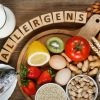2022
Nutrition resources for food allergy
For dietitians looking to upskill, or to gain confidence in recognising the need for onward referral, Education in Nutrition has a range of food allergy resources to help Food allergy in adults. Two-part series Amanda Jackson, APD Dietitians are commonly the first point of contact for adults with an undiagnosed food allergy.…
2022
Pursuing a Career as an Allergy Specialist Dietitian
 Amanda Jackson, APD and Marianne Tomlin, APD
Amanda Jackson, APD and Marianne Tomlin, APD
Are you interested in becoming an allergy specialist Dietitian? With the incidence of food allergy on the rise, the need for expert advice in this area is increasing. Melbourne based allergy specialist dietitians and members of the ASCIA Dietetic Group Amanda Jackson and Marianne Tomlin have put together a check…
2022
Fear of food presented by Marthe Van Iwaarden, Psychologist
 Anthea Talliopoulos, APD
Anthea Talliopoulos, APD
Cibophobia, or the fear of food, is an increasingly common condition effecting both adults and children. As dietitians working with clients, we are almost all certain to encounter individuals effected by this. Thus, it is crucial that we understand how food anxiety and related mental health conditions are diagnosed and…
2022
Female lifespan. Presented by Unna Goldsworthy AEP
Moving into female-specific exercise science for female-specific outcomes Within a month, and throughout a lifetime, a female’s body experiences a dynamic rhythm of changes that impact in physical, emotional and energetic ways. As we move forward with a spotlight on female specific science, we can harness the potential of these…
2022
Top tips for developing a career in disability
 Jayne Curlewis, APD
Jayne Curlewis, APD
For many people living with disabilities, the National Disability Insurance Scheme has increased access to allied health services - but there’s potential for further growth and for more input from dietitians. The 47% of NDIS participants not meeting current diet recommendations could benefit hugely from dietetic support - and for…
2022
Nutrition resources for people with a disability
There is a huge variation in the nutritional needs of people with a disability. The skillset required is broad and Education in Nutrition has on-demand professional development to help you keep up-to-date in best clinical practice in this area. In our library you’ll find practical advice including working in the…
2022
Exercise post COVID-19. Presented by Nathan Butler AEP
Assessment and prescription considerations for long COVID management *FREE* 1 CPD point - Available to download or stream now. “We talk about death, but what about the aftermath?” Nathan catches our attention with this very real question. He digs a little deeper with challenging details. Havervall et al (2021) found…
2022
Nutrition resources for older people
The nutritional needs of people change as they age. The skillset required is broad and Education in Nutrition has on-demand professional development to help you keep up-to-date in best clinical practice in this area. In our library you’ll find practical advice including preventative nutrition strategies for healthy ageing, nutrition interventions…
2022
Thinking of becoming an aged care dietitian? Here is what you need to know
 Karly Bartrim, APD, PhD candidate
Karly Bartrim, APD, PhD candidate
The dietetic aged care workforce is growing, and soon, there will be more work for dietitians in aged care! If the recent recommendations by the Royal Commission into Aged Care Quality and Safety are achieved, a dietitian will be required to see every resident for one hour per month, and…
2022
A dietitian’s guide to working in the NDIS. A 3-part series presented by Shannyn Thatcher, APD
 Anthea Talliopoulos, APD
Anthea Talliopoulos, APD
Since the official roll-out of The National Disability Insurance Scheme (NDIS) in 2016, many individuals living with disabilities have had increased access to allied health services. However, there is a potential for further growth; with at least 47% of participants not meeting current diet recommendations, NDIS participants could greatly benefit…